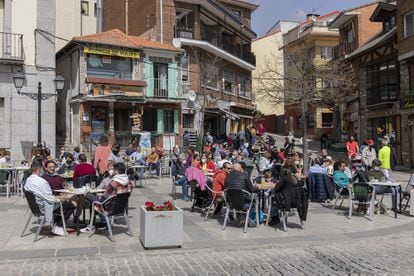Terraces in a square in Cercedilla, Madrid, last April Europa Press
I recently found at my parents' house an invitation, written by my hand of almost seven years, for a play that I had "staged" with some friends in town.
In it we summoned the neighbors on a certain Saturday in July to see
Ruperta
at “Desideria's door” —it is impossible for everyone to fit in his seat.
That afternoon I remember that the play was not performed, because the parents of two of my companions decided that it was a family bath day in the reservoir.
I wept heartily over our failed premiere, but the next day we were already imagining new diversions.
At some point, summers were different, they were really slow and they were pauses, a time in which everything was done because, except for a page of the booklet, there was nothing to do. In the absence of obligations there were invented games and the craziest distractions. The enforced tranquility, the stillness, were the possibility - germ - of everything that was born unexpected, before boredom appeared - or just so it did not appear. So, with so many hours ahead, we were masters of the time we had, as it is only in certain moments of childhood, as only those who have the most are also, free from the need to work.
With the old invitation in hand, he thought the other day that although summer had arrived, he felt only in the heat: when the last students collect their things in the faculty, the doors of the academic buildings are closed with the teachers inside.
The work does not slow down, because the teacher has to give, even more, his life to the paperwork, servants of the paperwork in July and not of the education.
August and his freedom will be used to increase the curriculum because it is necessary to perform according to the meters and
produce
: lectures, articles, books that were pending during the school months.
While the projects overlap, there is no time to digest, there is no necessary distance for the idea, the thought needs rest to settle and settle.
In the non-existent rebellion against the absurd bureaucracy, no one dares to say, or rather no one can say, “I would rather not do it”, like Bartleby.
This is not something that happens only to teachers, in fact they are not the question, I look around and nobody seems to ever stop either.
Almost two years ago I attended a meeting where one of the attendees proudly defined himself as a
workaholic
or workaholic — it never
hurts to
remember that work in Latin was
tripalium
, an instrument of torture. Much has been the interest on the part of others, not without a certain perversity, to negatively charge the notion of rest, of true detention with its tranquility and pleasure. Leisure, an essential area of life, the engine of so many things, has been denigrated, despite the fact that our chosen activities, be they of a physical, social, artistic, intellectual or spiritual nature, return to us in the form of learning, satisfaction and well-being, among other things.
Alongside the one who boasts of his
workaholism,
we witness the bankruptcies of both: the notable increase in burned-out worker syndrome, the physical and mental exhaustion of supersaturation. There is an unmistakable dissatisfaction and discomfort in these mechanisms of speed and the erroneous idea of productivity — no matter how hard they try, “performing like machines” was always just a metaphor.
It is necessary to think about the limits that are imposed on us and the ways of understanding that underlie them, because the important question is always how to live and the answers, which must be in perpetual change, cannot be provided by a factory in terms of profitability. In fact, as long as a
perfect
system is not questioned
, those who are out of tune will continue to be us, failed robots, and our
weakness
. Society fails if its humanity is singled out for contempt.
And it is essential, but very difficult to stop when they want to convince us of the benefit of
employment,
and the media insists that absolute disconnection is now a "thing of the past." It is very difficult to stop if the need to stop is a cause for derision. It is very difficult — impossible — to stop if we are gripped by fear of dismissal, in addition to murky notions of obligation, responsibility and guilt. It is very difficult to stop because we do not conceive of the world in any other way than rolling clumsily and adrift.
And here we are;
Faced with the summers of childhood, these are those of adults, a
continuum
of productivity without limits.
Our few bright days arrive and there is the other urgency: accumulated leisure watches us from the corner.
We will travel fast, we will meet fast, we will talk fast - there are a lot of people to see;
let this little time not pass without doing what we must do.
What an endless race, what a fatigue.
Who could be dreaming this afternoon of representing
Ruperta
.
August has arrived and we are still so poor that, even now, we have no time to waste.
Maribel Andrés Llamero
is a professor at the University of Salamanca and a poet.

